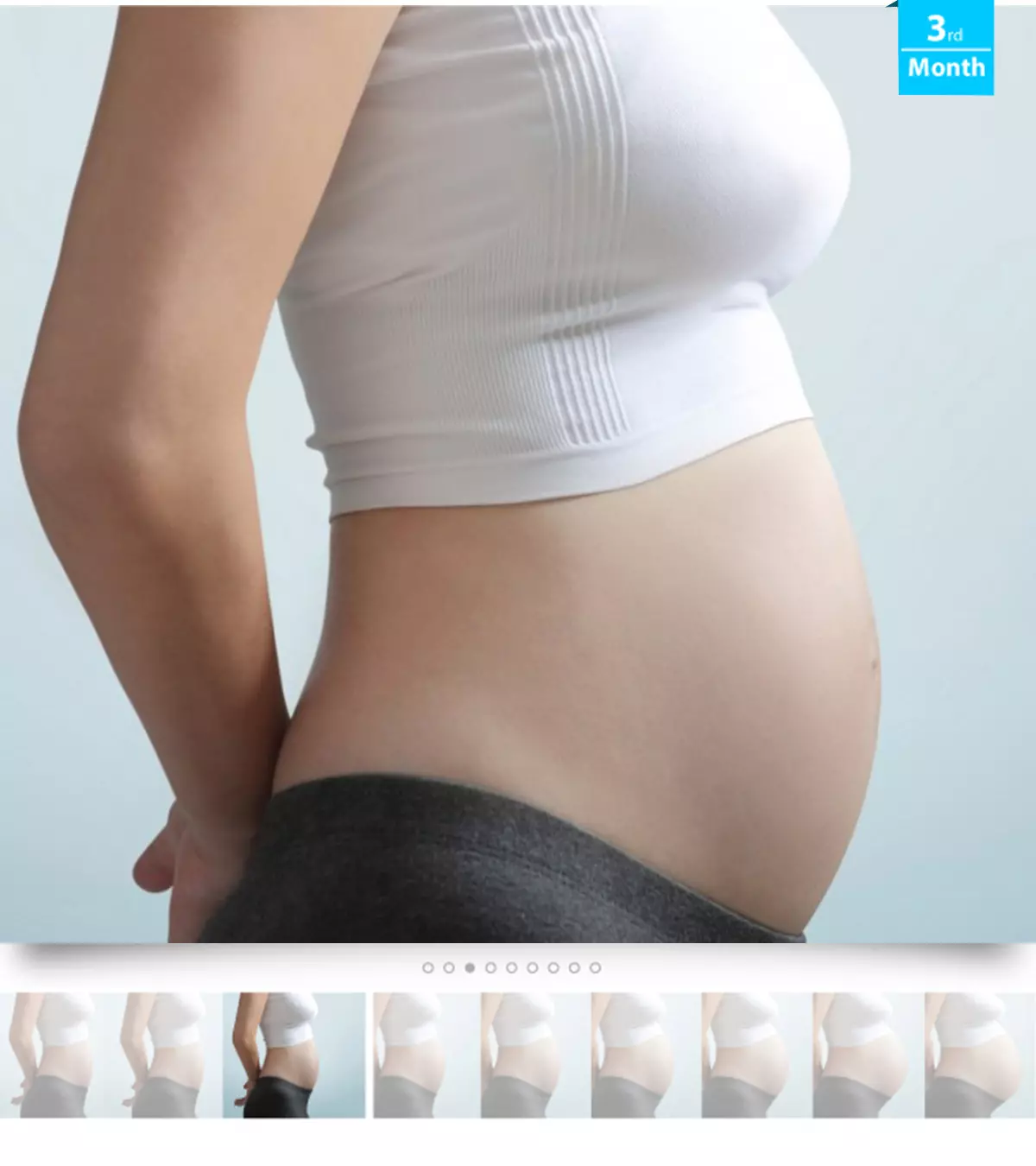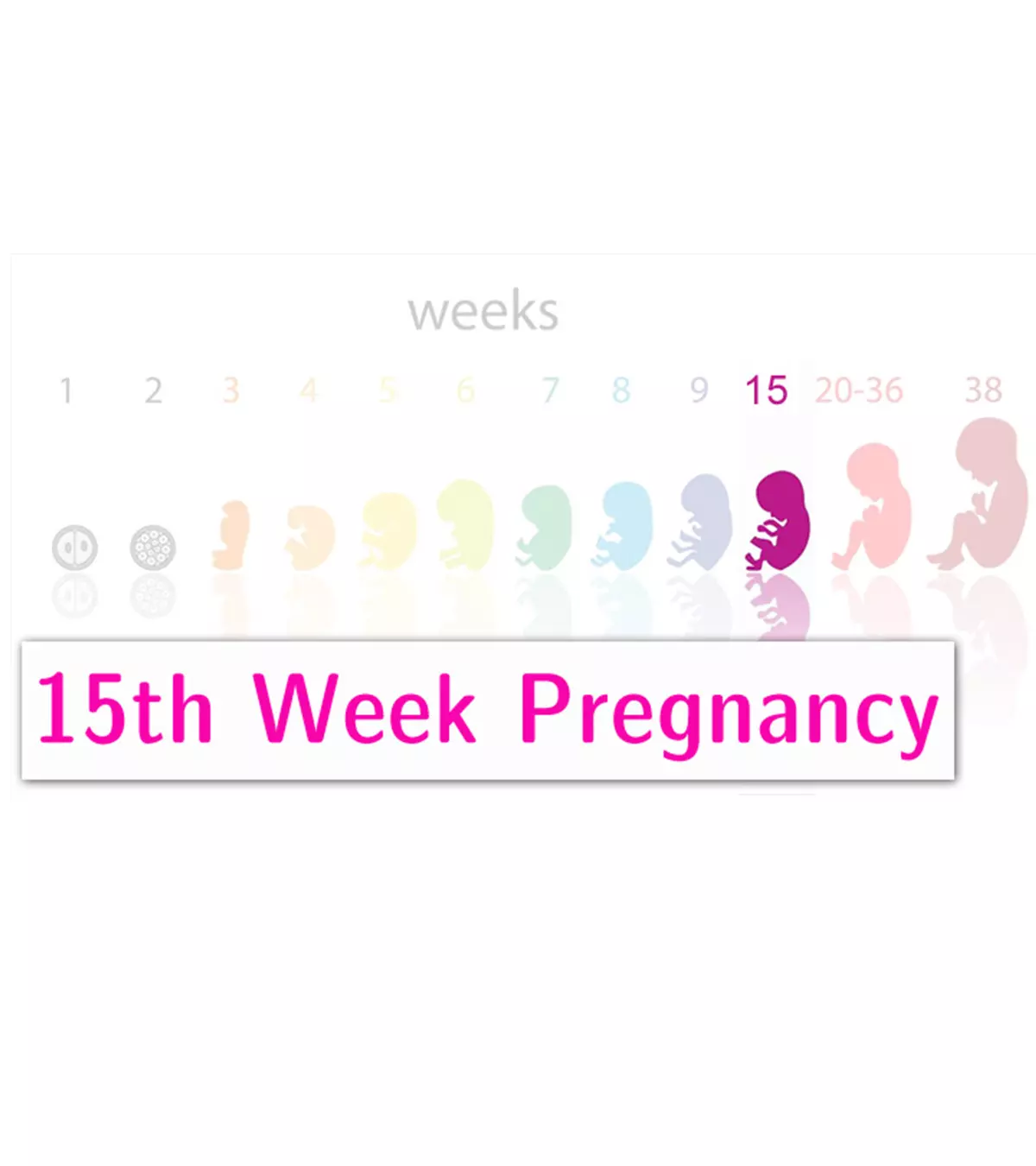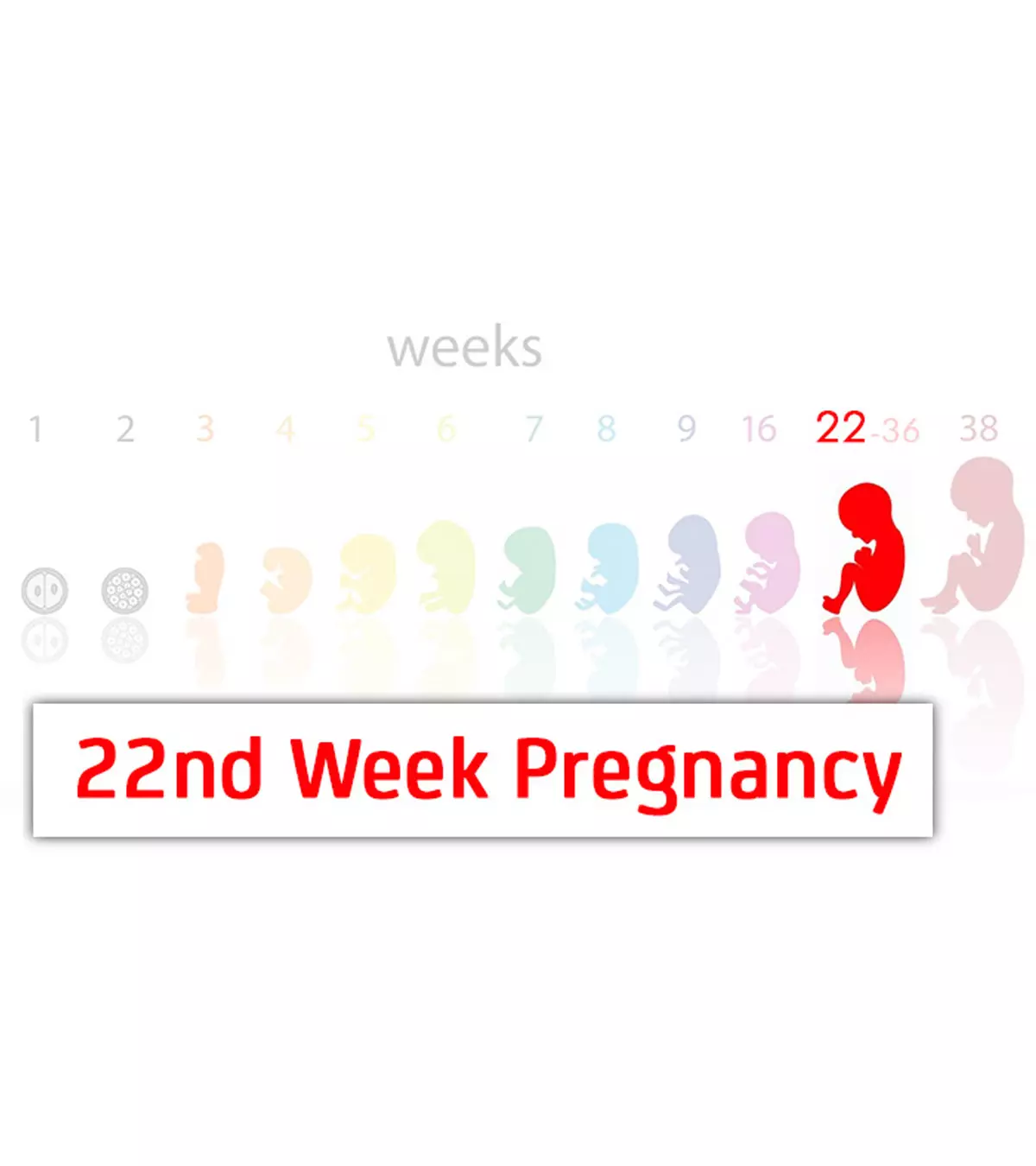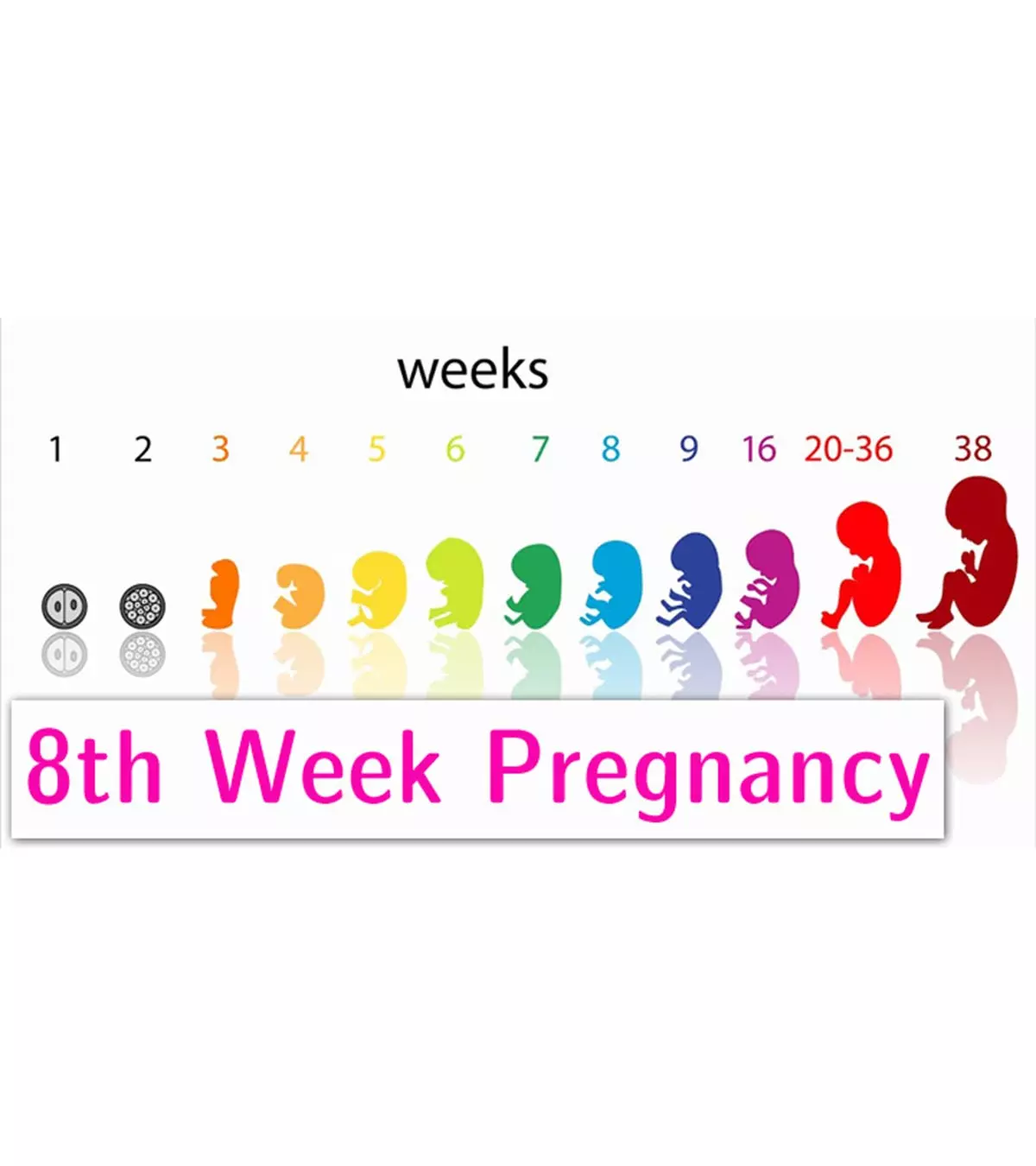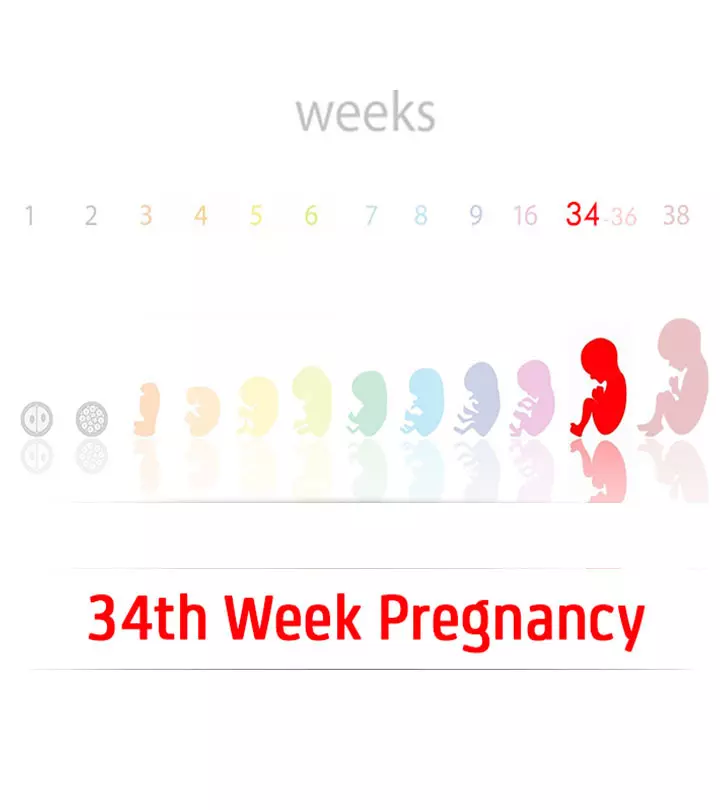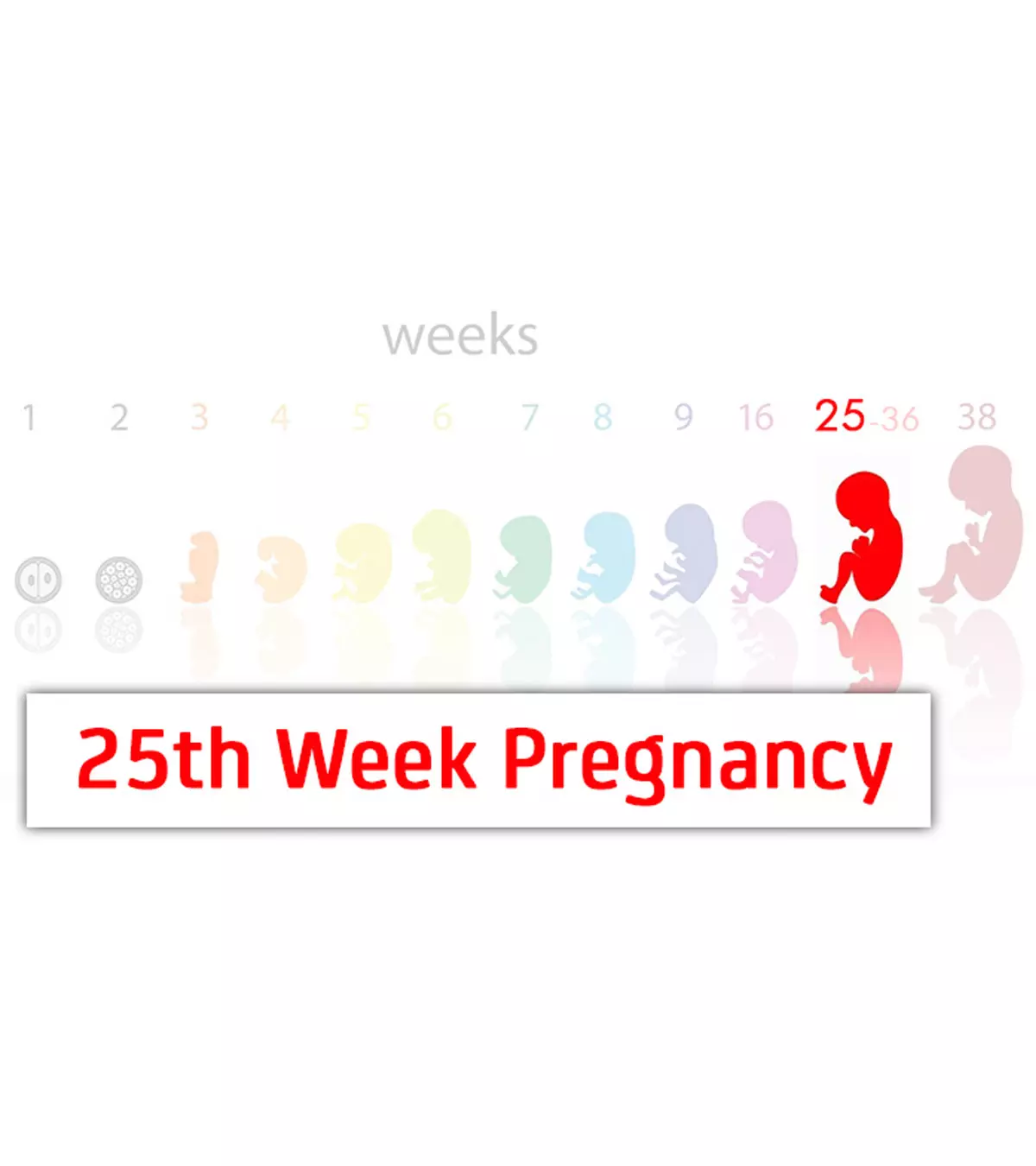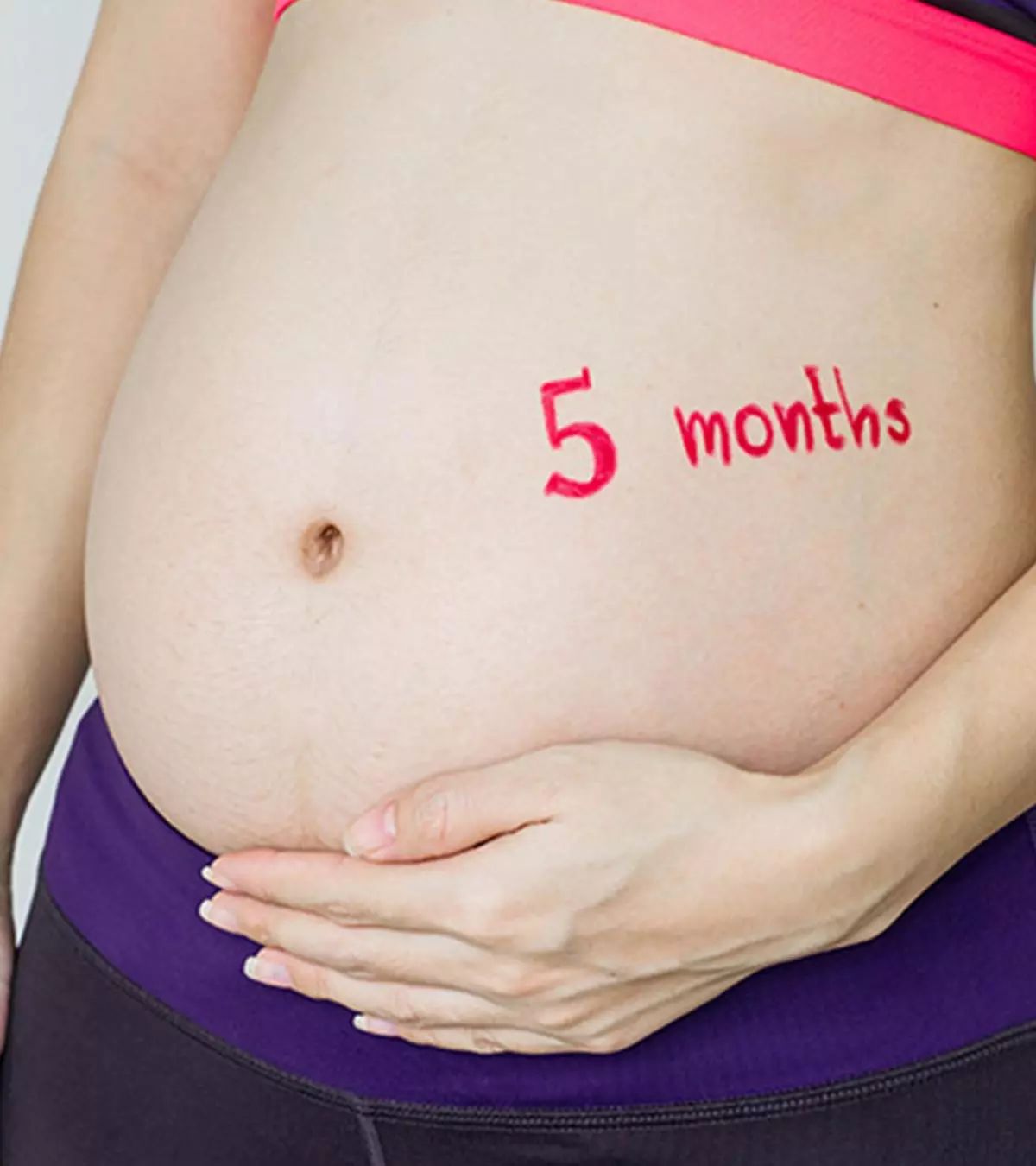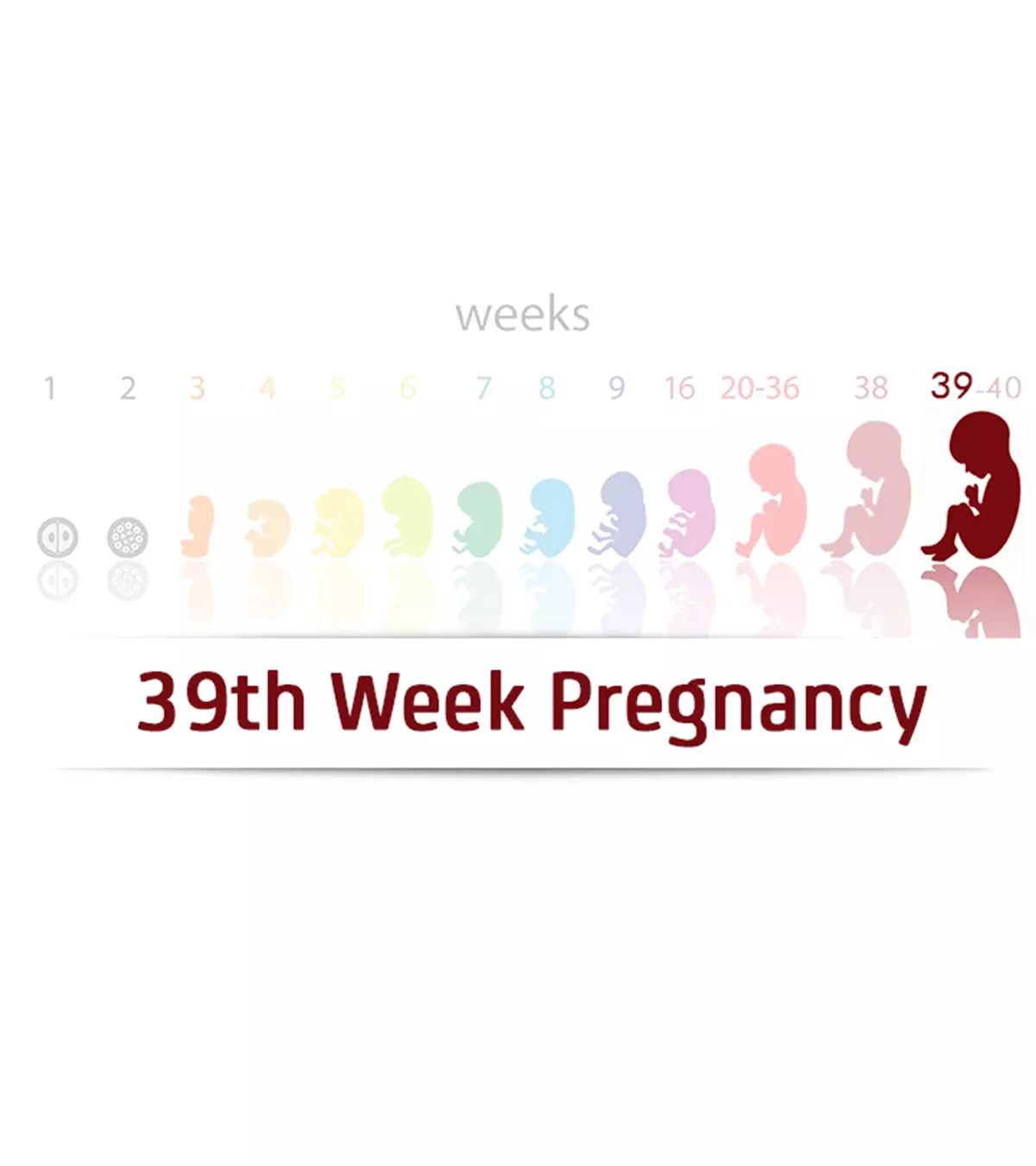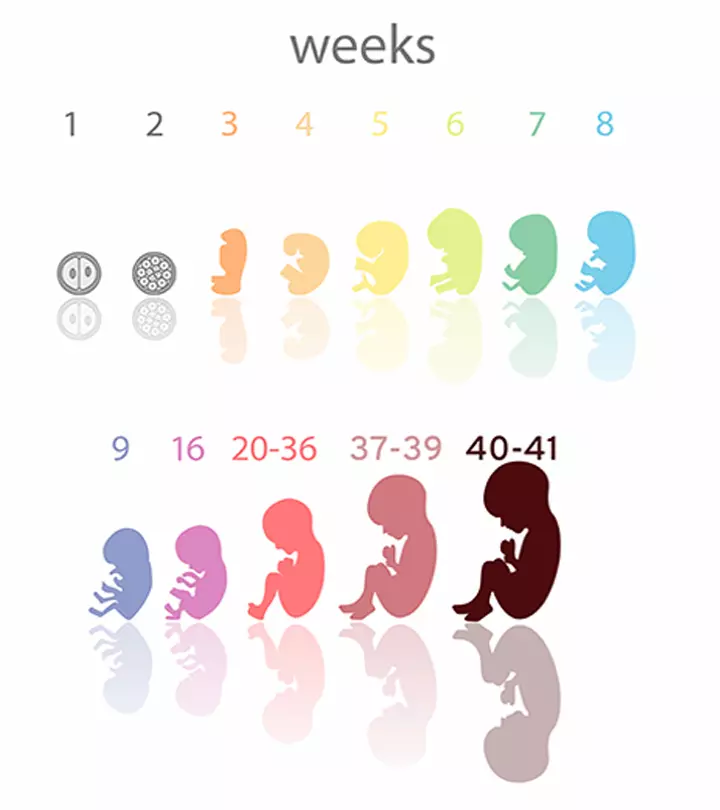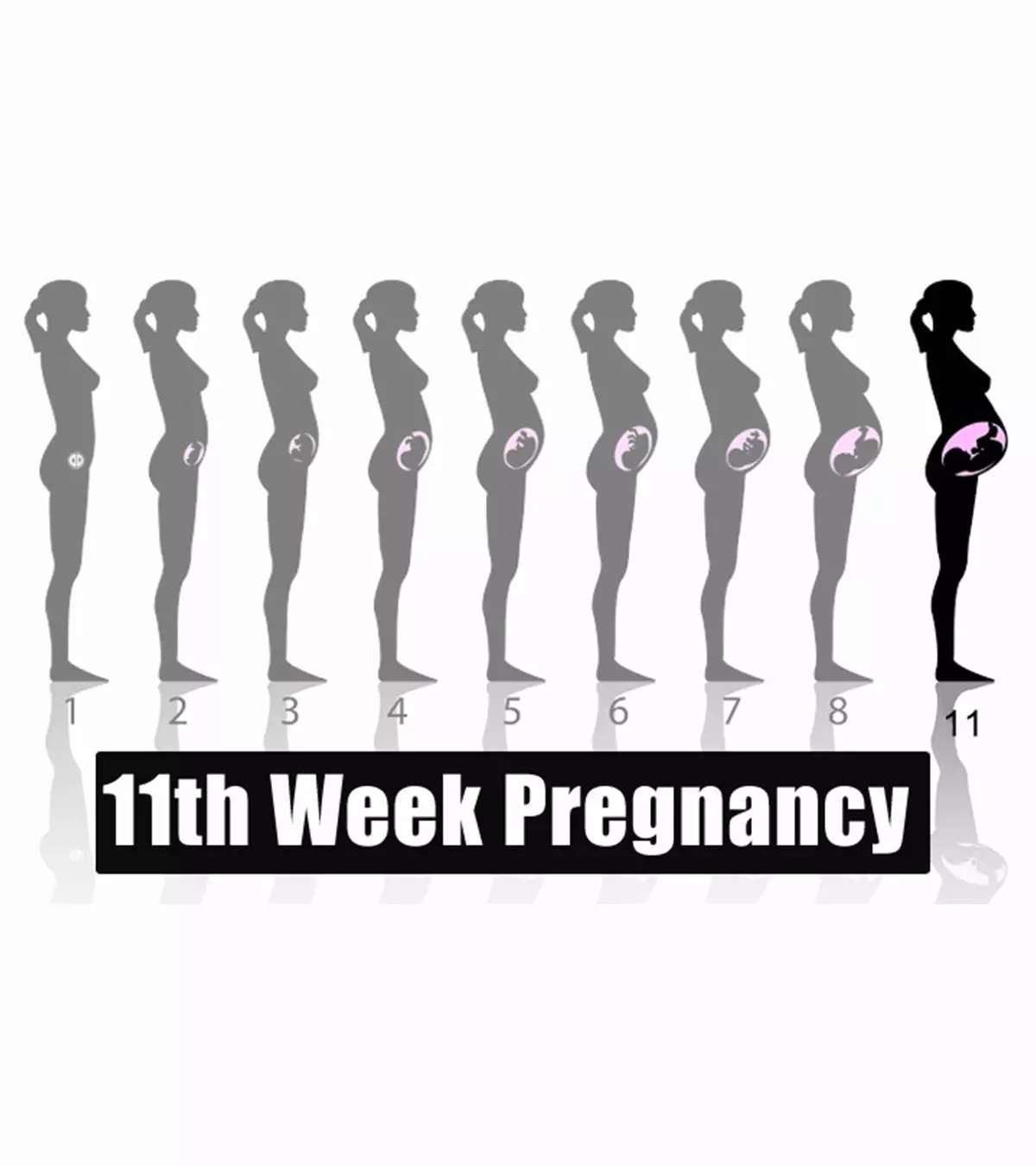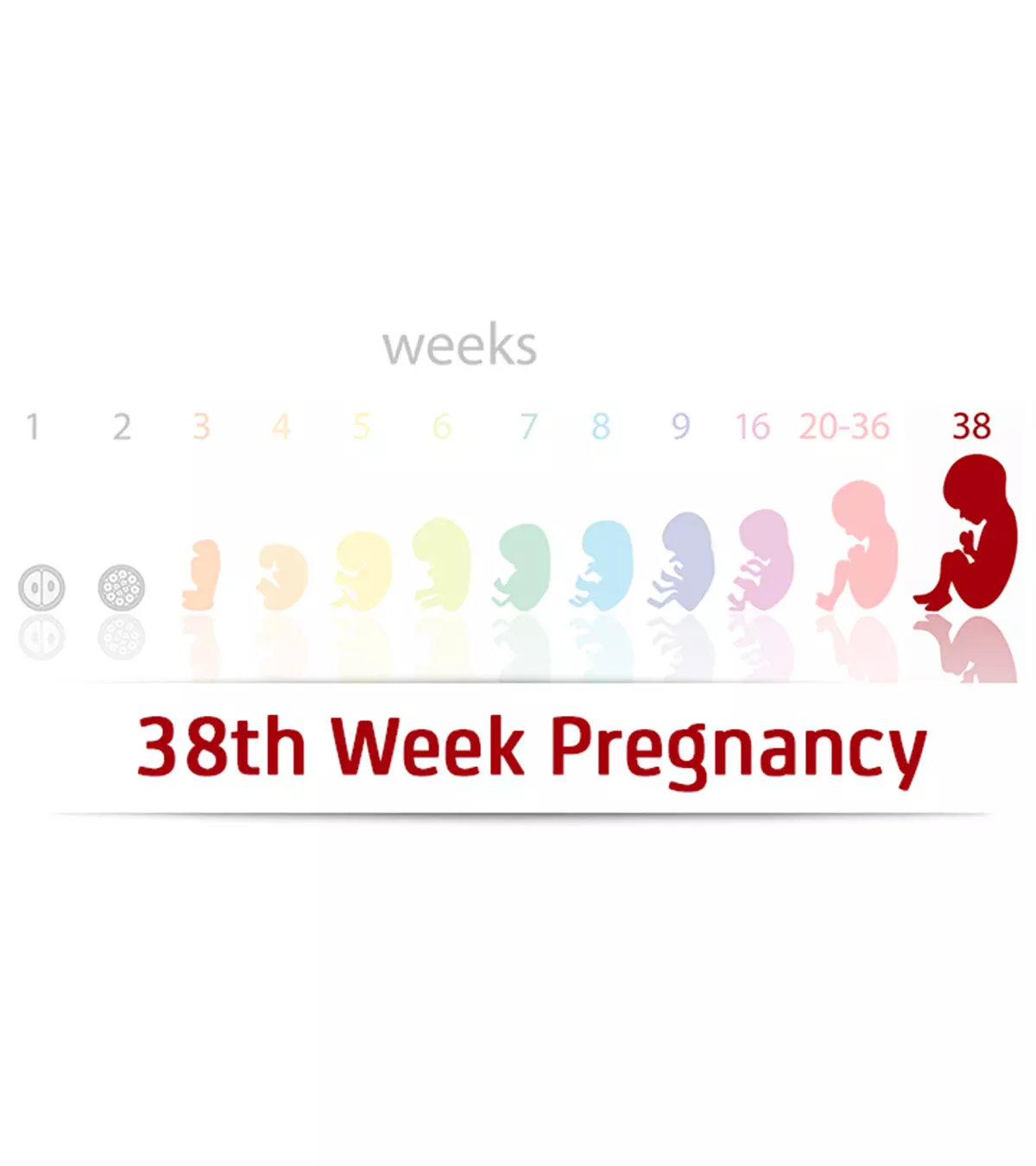
Image: Shutterstock

Key Pointers
- The baby measures 19.61in (49.8cm) and weighs 6.8lb (3.08kg), and is in a head-down position due to lack of space in the womb.
- At 38 weeks, the baby’s skin is smooth, head hair is thicker, finger and toenails have grown, lungs are fully matured, and the intestine is full of meconium.
- Symptoms include difficulty sleeping, frequent urination, backache, Braxton Hicks contractions, mucus plug discharge, bloody show, and diarrhea.
- Physical and emotional changes include an enlarged belly, darker areola, and leaking colostrum, an itchy belly, anxiety, mood swings, and nesting instincts.
How Many Months Pregnant Are You At 38 Weeks?
At 38 weeks, you are eight months and two weeks pregnant and nearly at the end of the third trimester. This is the home stretch of pregnancy, which means you can expect the onset of labor at any time from now.
How Big Is Your Baby At 38 Weeks?
The baby is as long as a leek this week. Babies usually measure 19.61in (49.8cm) in length and weigh 6.8lb (3.08kg) (1).
You have entered the full-term pregnancy, which means that your baby must be almost ready to be born. Keep reading to know how much your baby has grown by now.
Baby Development At 38 Weeks
Here is how your baby is developing this week.
| Body parts | Development stage |
|---|---|
| Skin (2) | Becomes smooth. Fat deposits under the skin make the baby look plump. VernixiA white, waxy protective layer that covers the skin of the fetus in the last trimester. coating is shed into the amniotic fluid (3) |
| Eyes (4) | If both the parents are blue-eyed, the child is more likely to be blue-eyed. The child of brown-eyed parents will most likely have brown eyes. |
| LanugoiSoft, thin hairs that cover the fetus in utero and shed soon after birth. (5) | Remains only on the shoulders and upper part of the body |
| Nails | Finger and toenails have grown till the tips |
| Breast buds | Present on the chest of both the sexes |
| Hair | Head hair is thicker and coarser |
| Lungs (6) | The organ is usually matured by this time |
| Reflexes | Grasps fingers firmly and responds to light |
| Intestine (3) | Full of meconium, which is a greenish-black matter consisting of amniotic fluid, dead cells, and the waste products from the pancreas, gallbladder, and liver |
| Umbilical cord 7 | Measures 20-24 inches in length |
Fetal position and movements
The baby is in a head-down position and moves down into the pelvis during this week, but will be less active or move less due to the lack of sufficient space inside the womb. However, if you notice any significant drop in the baby’s movements, then go for a check-up with your healthcare provider.
Most of the symptoms that you have been experiencing throughout the last couple of months will continue till you deliver. More about them next.
What Are The Symptoms Of 38 Weeks Pregnancy?

Here are some of the symptoms you are likely to have at 38 weeks pregnancy:
- Braxton Hicks contractions are irregular and less painful and go away when you change your positions. They prepare the body for delivery.
- Sleeping becomes difficult with the big baby bump (enlarged belly), aches, and restlessness associated with the later stages of pregnancy. Rachel Zimm, a mother of four, recounts her sleep troubles during the 38th week of pregnancy, “It’s hard for me to want to go to sleep at night because I don’t feel comfortable lying down. When I wake up in the middle of the night, I have a little bit of trouble falling asleep (i).”
- A thick and mucus-like vaginal discharge called mucus plug is released, indicating cervical dilation.
- Edema or excess water retention in the body leads to swollen ankles and feet. Drinking a lot of water will help expel the excess fluids from the body.
- The breast starts leaking milk called colostrum, the first milk that your baby will feed on.
- The frequency of urination increases due to the pressure that the uterus puts on the bladder.

- The extra pressure of carrying the baby can stress the lower back and cause a backache.
- Hormonal fluctuations could be a reason for diarrhea.
- Bloody show is a vaginal discharge mixed with blood and appears pink or brown. The bleeding is caused due to small ruptures of cervical blood vessels during effacement and dilation.
The physical and emotional changes that you may experience in this week are no different from what you may have experienced a week or two ago.
 Quick tip
Quick tipHow Does The Body Change In The 38th Week?
Here are some of the physical and emotional changes you might notice during this week:
Physical changes
- Enlarged belly: The belly looks bigger as the baby is fully grown.
- Breasts: The areola becomes darker and starts leaking colostrum.
- Itchy belly: As the belly gets stretched, the skin develops stretch marks and becomes more sensitive and itchy. Applying a moisturizer can help relieve the itchiness to some extent.
Emotional changes

- Anxiety, as you’re nearing the due date.
- Mood swings, due to hormonal fluctuations.
- You are likely to develop nesting instincts and start preparing to welcome the new member.
Since your pregnancy is full term, you could get into labor any time. Read on to know the signs and symptoms of labor this week.
Signs Of Labor In The 38th Week
Here are the signs of labor you must look out for during this week (8):
- Lightening, when you feel your baby drop deeper down into the pelvis.
- Thick mucus-plug discharge from the vagina.
- Rupture of the amniotic sac associated with a constant water leak or a gush of fluids.
- Frequent and painful contractions at regular intervals.
- Low, dull backache.
- Bloody show.
- Cramps with or without diarrhea.
- Increased pelvic pressure and changes in discharge consistency.
If the labor pain starts naturally in the 38th week, it means your baby is ready to come out and is going to be just fine
.
In the case of medical conditions like gestational diabetes, preeclampsiaiA pregnancy disorder characterized by high blood pressure, water retention, and protein content in urine. , placental problems, or uterine infections, the doctor may suggest labor induction this week. If there are no signs of labor at this time, you will have your regular OB/GYN visit.
 Point to consider
Point to considerYour OB/GYN Visit

During the visit, your doctor in the obstetrics department will (9):
- Check weight gain and blood pressure.
- Take a urine sample to test for protein levels.
- Ask you about any physical discomfort such as heartburn and sleeping troubles, and about the baby’s movements.
- Measure the height of the uterus to gauge the size of the baby.
- Get an ultrasound to check the length and weight of your baby, as well as the heart rate, breathing pattern, and the level of amniotic fluid.
- Check the cervix to know how much you have dilated
During this visit the doctor will also discuss:
- Gestational diabetes, anemia, intrauterine growth restriction (IUGR), breech positioningiA position in which the babies’ feet or buttocks are positioned to come out of the vagina at first. , if you are at the risk of these.
- Pregnancy-induced hypertension
- Other medical problems
- Symptoms you should watch out for (including the onset of contractions and water breaking) and when to call the doctor.
- Delivery processes, including the natural birth procedure and the likelihood of cesarean section if necessary.
- The availability of a midwife or doula and the presence of your partner in the delivery room.
As you sail through the last few days of pregnancy, you need to follow a healthy routine to ensure a safe delivery and the birth of a healthy newborn. Read on for tips for the parents-to-be.
Tips For The Mom-To-Be
- Engage in physical activities like walking to stay active and energetic. Squatting and kegel exercisesiPelvic floor muscle training exercises that can help prevent bladder problems and improve bowel control. help strengthen your pelvic muscles.
- Get plenty of rest.
- Follow a healthy diet. Eat home-cooked meals.
- Avoid deep-fried and fatty foods.
- Stay calm and keep stress at bay.
- Practice breathing exercises.
- If you have already taken maternity leave, spend time with your husband, family, and friends.
- Never hesitate to seek help from your family or friends if needed.
- Wear comfortable and loose clothes. Avoid wearing heels and get a pair of flats and slippers.
Next, find out how your husband can help you through this week.
Tips For The Dad-To-Be
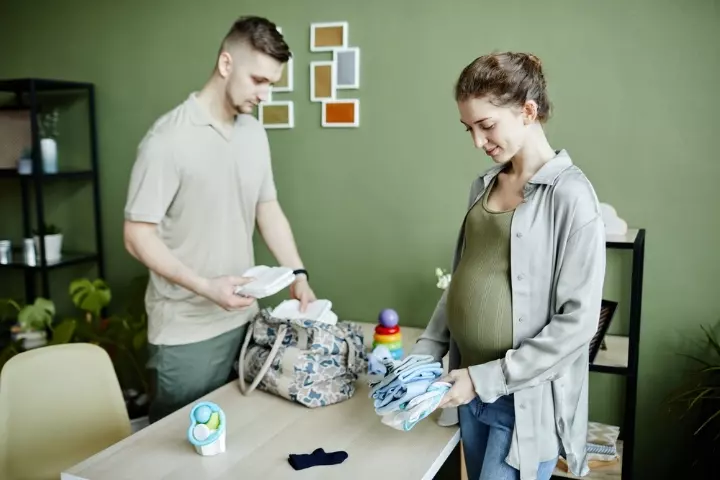
Your partner also goes through overwhelming feelings in anticipation of labor. However, here is how he can help you receive optimal prenatal care and care for you this week.
- Gather details and documents necessary for claiming insurance covering the costs of delivery. Also put together paperwork that is needed before you get into labor.
- Listen to the doctor’s instructions carefully during the last few prenatal visits, to help you stay calm and relaxed during delivery.
- Understand how you want to deliver.
- Inquire about the hospital, its policies, and how they are going to take care of the patient.
- Keep the maternity bag ready, with all the essential items that you will need in the hospital.
 Quick tip
Quick tipFrequently Asked Questions
1. Is the 38th week good for delivery?
Delivery on the 38th week is not recommended by experts unless there is a clear medical requirement due to maternal or fetal conditions. Carrying a baby to full term, which is typically between 39 to 40 weeks, provides benefits for both the baby and mother and ensures optimal fetal development. Babies’ lungs and brains develop during their 37th and 38 weeks and gain body fats. This helps in better cognitive development and temperature regulation after birth (10).
2. Is 38 weeks pregnant full term?
According to the American College of Obstetricians and Gynecologists (ACOG), babies born at 37 and 38 weeks of gestation are considered early term. And babies born at 39 and 40 weeks are considered full-term babies. Although babies born after 37 weeks of pregnancy were considered term in the past, the recent recommendations considered full term only if pregnancy is at 39 weeks since the babies born beyond this time do better than those born earlier (11) (12).
3. How dilated should you be at 38 weeks?
Around 38 weeks, the cervix rotates from the rear-facing to the forward-facing position, and the effacement occurs. Effacement is the thinning of the cervix. After the effacement, the opening gradually widens, called dilation. Although more notable effacement and dilation happen during labor, the process can begin a few weeks earlier, around the due date (13).
4. Why does my belly feel hard at 38 weeks pregnant?
Belly feels hard at 38 weeks of pregnancy because the expanding uterus pushes up against the abdominal wall. The occurrence of Braxton-Hicks contractions that prepare the uterus for labor is what causes the belly to feel hard during this time (14). However, a hard belly becomes a cause of concern if accompanied by pain or bleeding.
5. How can I manage anxiety as my due date approaches?
Managing your anxiety becomes crucial as your due date approaches. Consider engaging in regular physical activities that your doctor deems safe for you and prioritize your sleep. Practice mindfulness and try journaling to process your feelings. Additionally, relaxation techniques like yoga, massage, or meditation can offer mental and physical health benefits even after the baby arrives (16).
Your baby has reached full term, weighing an average of 6.8 pounds, and may have shifted into a head-down position for birth during the 38th week of pregnancy. Since your body is preparing for childbirth, you would experience Braxton Hicks contractionsiFalse labor pains characterized by irregular tightening in the belly that comes and goes during pregnancy. . Other conditions include breast milk leakage, thick and mucus-like vaginal discharge, and emotional changes. You may also experience an increase in urination and diarrhea. Nevertheless, it is also the time for you and your partner to prepare yourselves for the baby’s arrival and take help if needed.
By the 38th week of pregnancy, your baby will be fully grown, and you may go into labor at any time now. Therefore, you may also experience various pregnancy-related symptoms at this stage. The infographic below includes some of the common symptoms you may experience during the 38th week.
Some thing wrong with infographic shortcode. please verify shortcode syntaxIllustration: 38th Week Pregnancy: Symptoms Baby Development And Tips

Image: Stable Diffusion/MomJunction Design Team
Discover what’s in store for both your body and baby during the 38th week of your pregnancy. This informative video will walk you through the upcoming changes.
Personal Experience: Source
MomJunction articles include first-hand experiences to provide you with better insights through real-life narratives. Here are the sources of personal accounts referenced in this article.
i. Baby bump: 38 weeks.http://www.rachelzimm.com/2014/01/baby-bump-38-weeks.html
References
- Fetal Development.
https://embryology.med.unsw.edu.au/embryology/index.php/Fetal_Development - FETAL GROWTH AND DEVELOPMENT.
https://doh.sd.gov/media/bnemplje/fetal.pdf - 38 weeks pregnant.
https://raisingchildren.net.au/pregnancy/week-by-week/third-trimester/38-weeks - What Color Will My Baby’s Eyes Be?
https://www.healthychildren.org/English/ages-stages/baby/Pages/Newborn-Eye-Color.aspx - Fetal development.
https://medlineplus.gov/ency/article/002398.htm - 38 Weeks Pregnant.
https://americanpregnancy.org/healthy-pregnancy/week-by-week/38-weeks-pregnant/ - Prenatal Summary.
https://www.ehd.org/prenatal-summary.php - When does labor usually start?.
https://www.nichd.nih.gov/health/topics/labor-delivery/topicinfo/start-of-labor - Prenatal visits: What to expect at the doctor’s office.
https://www.northwell.edu/obstetrics-and-gynecology/obstetrics/what-to-expect/weekly-appointments - Scheduling Early Delivery Of Your Baby.
https://choosingwisely.org/ - Definition Of Term Pregnancy.
https://www.acog.org/clinical/clinical-guidance/committee-opinion/articles/2013/11/definition-of-term-pregnancy?utm_source=redirect&utm_medium=web&utm_campaign=otn - Know Your Terms.
https://www.nichd.nih.gov/ncmhep/initiatives/know-your-terms/moms - Your Pregnancy Week By Week: 38 Week.
https://www.lamaze.org/Giving-Birth-with-Confidence/GBWC-Post/your-pregnancy-week-by-week-38-weeks - 38 weeks pregnant: baby’s development, leaking nipples and staying active.
https://www.tommys.org/pregnancy-information/im-pregnant/pregnancy-week-by-week/38-weeks-pregnant - Braxton Hicks contractions;
https://www.pregnancybirthbaby.org.au/braxton-hicks-contractions - How can you manage anxiety during pregnancy?;
https://www.health.harvard.edu/blog/how-can-you-manage-anxiety-during-pregnancy-202106252512
Community Experiences
Join the conversation and become a part of our nurturing community! Share your stories, experiences, and insights to connect with fellow parents.
Read full bio of Jacky Bloemraad-de Boer
Read full bio of shreeja pillai
Read full bio of Rebecca Malachi
Read full bio of Aneesha Amonz






